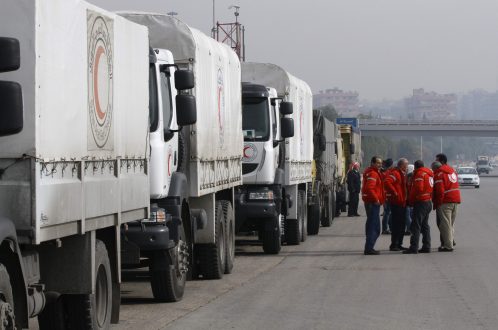Food aid reaches starving Syrian town under siege
The first shipment of desperately needed food aid reached a besieged Syrian town on Monday as part of a U.N.-backed agreement to bring relief to starving residents who say they have been forced to eat leaves and cats.
About 50 vehicles packed with food and medical supplies left the Syrian capital, Damascus, for Madaya, a town near the Lebanese border cut off by Syrian forces, said Pawel Krzysiek, a spokesman for the International Committee of the Red Cross who was traveling with the convoy. The first vehicles in the convoy rolled into the town hours later.
“The operation has started. It is likely to last a few days,” Marianne Gasser, head of the ICRC delegation in Syria, said in a statement.
Since July, residents of Madaya have faced a punishing blockade by Syrian government forces and allied fighters from Lebanon’s powerful Shiite Hezbollah militia. Images on social media purport to show emaciated residents saying that they have resorted to making soup with grass and eating household pets for sustenance.
[Aid group: Starvation claims more lives in Madaya]
“People are nervous but thankful that help is arriving,” Badie Abdulhalim, 39, a resident of the town, said by telephone. “I have four young children who haven’t had milk and food for seven months.”
Aid groups say about two dozen people, including children, have died from starvation in Madaya, a pro-rebellion town about 15 miles west of Damascus, but a longer journey by road. The Britain-based branch of the medical charity Doctors Without Borders said that five people in the town, including a 9-year-old boy, died of starvation Sunday.
Ashley Proud, Mercy Corps’ director for south and central Syria, said that the level of malnourishment in besieged areas “will not be solved by a single aid delivery.”
“We must have unfettered, direct humanitarian access so that the people of Madaya — and all Syrians in need — receive deliveries of lifesaving supplies,” Proud said in a statement.
Meanwhile, suspected Russian air raids Monday in the northern Aleppo province killed at least 12 Syrian schoolchildren, according to the Britain-based Syrian Observatory for Human Rights, which monitors the conflict.
Russia, which intervened in September to prop up President Bashar al-Assad, has been accused by human rights groups of killing scores of civilians with airstrikes across the country. Officials in Moscow deny such accusations.
The agreement to provide relief to Madaya — brokered last week with the Syrian government — is a rare glimmer of hope in the conflict. The U.N.’s World Food Program says the food bound for Madaya will feed about 40,000 residents for a month.
Krzysiek, the ICRC spokesman, said the agreement also involves about 20 trucks containing food and medicine that were dispatched Monday to Fua and Kefraya, pro-government villages in northwestern Syria that have been besieged by anti-Assad rebels.
Blockades are common in Syria’s civil war, which has led to more than 250,000 deaths and displaced millions of people.
Critics accuse the Assad government of systematically depriving opponents of food as a weapon of war, and they also criticize the United Nations for regularly attempting to negotiate an end to such sieges rather than unequivocally calling on the Syrian leader to permit the unrestricted flow of humanitarian aid.
Rebel forces also face accusations of denying food to besieged areas.
Imad Salamey, a professor of political science at the Lebanese American University, said the purpose of such blockades by pro-government forces is generally to drive out fighters and their sympathizers — who are generally members of Syria’s majority population of Sunni Muslims — from areas that are deemed strategic for Assad. Those areas, which make up a third or less of the country’s pre-war territory, run from Damascus to the border with Lebanon to the western coastline.
Sunnis lead the rebellion against Assad, who is from the minority Alawite religious sect, which is an offshoot of Shiite Islam.
“If the government can’t get these people to submit to its politics, then it uses tactics that will convince these people to leave these vitally important areas,” he said.
Source: Food aid reaches starving Syrian town under siege – The Washington Post

